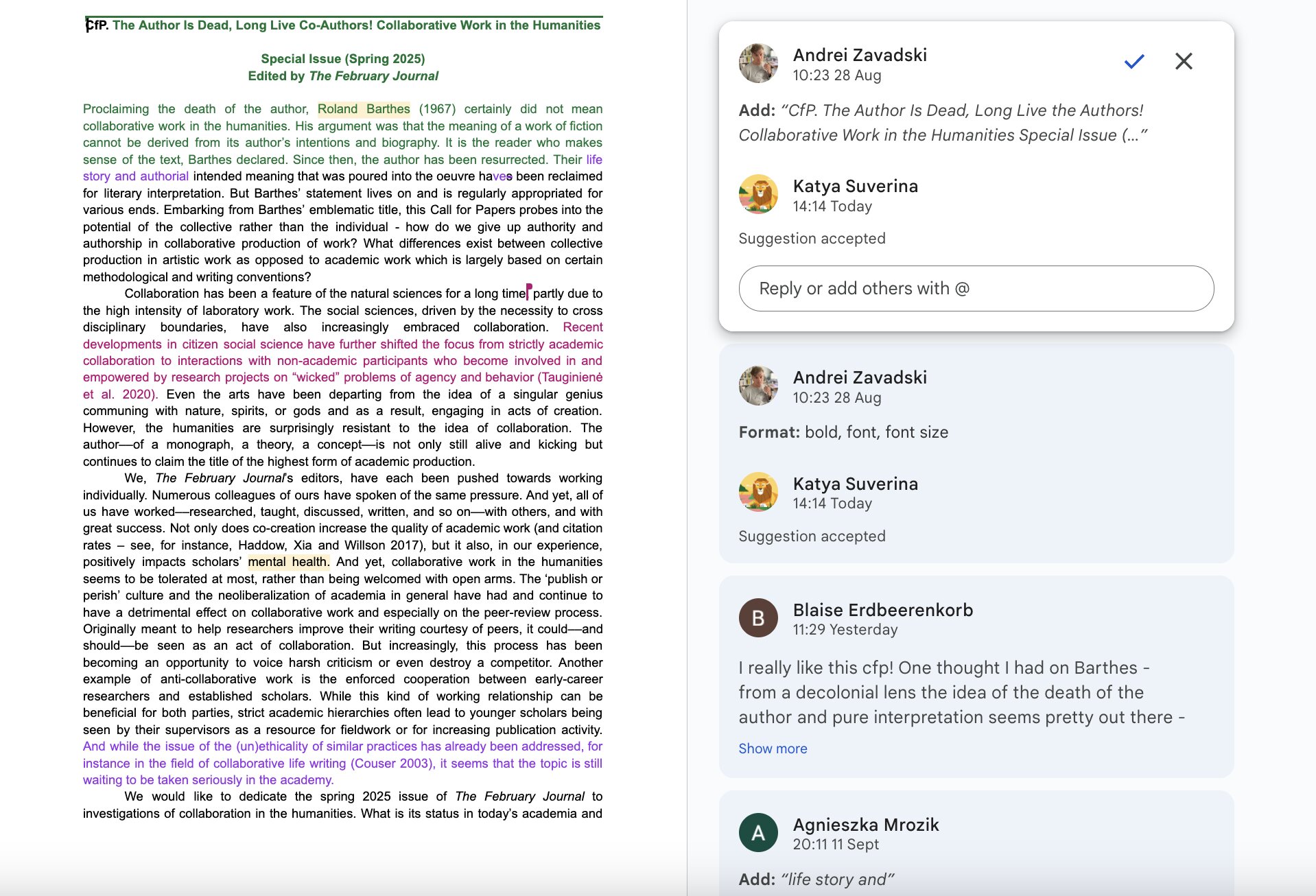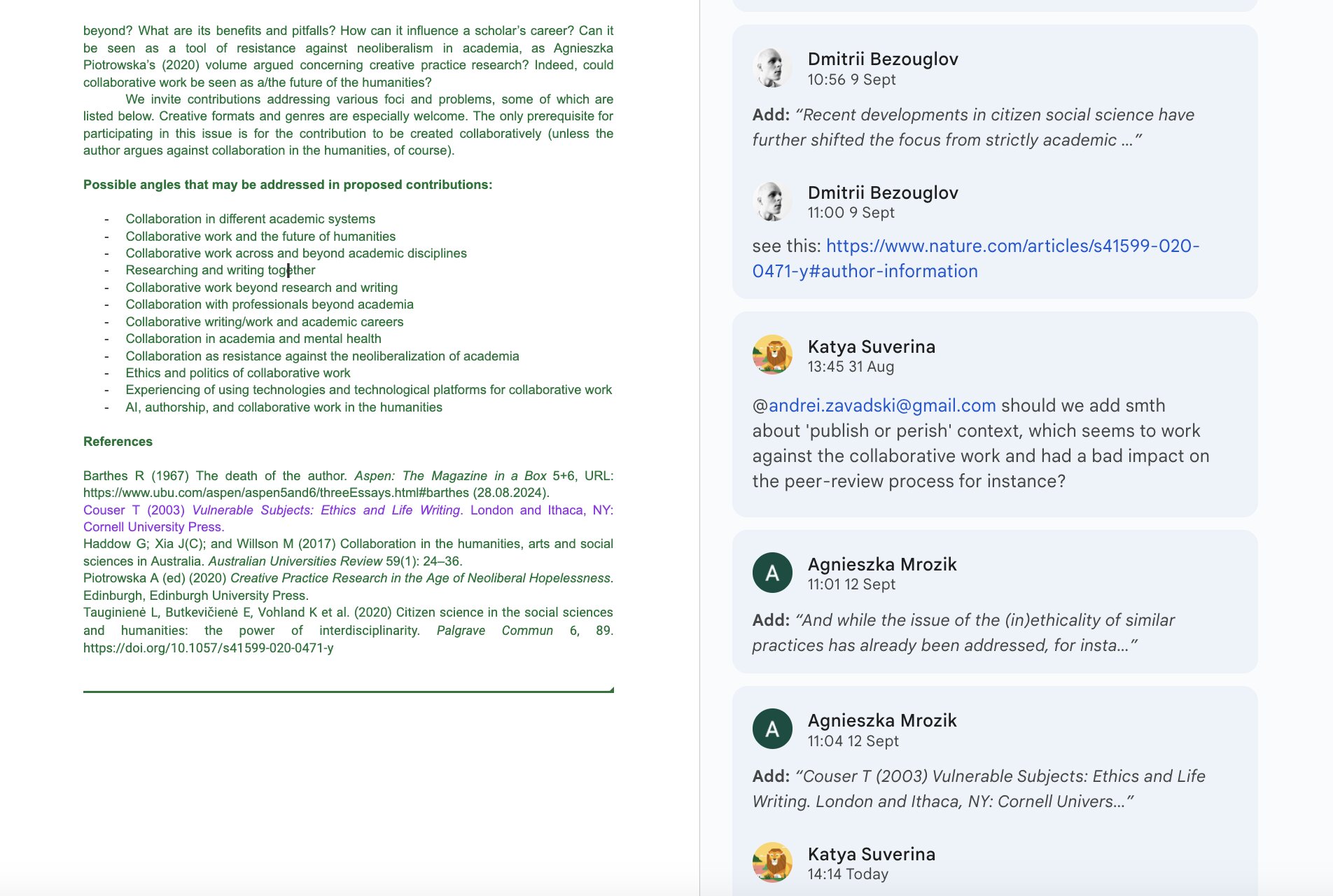CfP. The Author Is Dead, Long Live Co-Authors! Collaborative Work in the Humanities

Mary Long (courtesy of the artist, Adobe Stock Archive)
Special Issue (Fall 2025)
Edited by The February Journal
Proclaiming the death of the author, Roland Barthes (1967) certainly did not mean collaborative work in the humanities. His argument was that the meaning of a work of fiction cannot be derived from its author’s intentions and biography. It is the reader who makes sense of the text, Barthes declared. Since then, the author has been resurrected, and their life story and authorial intent have been reclaimed for literary interpretation. But Barthes’s statement lives on and is regularly appropriated for various ends. Embarking from the philosopher's emblematic title, this issue of The February Journal will probe into the potential of the collective rather than the individual. How do we share authority and authorship in academic production? What differences exist between artistic collaboration and co-creation in academia?
Collaboration has been a feature of the natural sciences for a long time, partly due to the high intensity of laboratory work. The social sciences, driven by the necessity to cross disciplinary boundaries, have also increasingly embraced collaboration. Recent developments in citizen social science have further shifted the focus from strictly academic collaboration to interactions with non-academic participants who become involved in and empowered by research projects on the “wicked” problems of agency and behavior (Tauginienė et al. 2020). Even the arts have been departing from the idea of a singular genius communing with nature, spirits, or gods and engaging in acts of creation as a result. However, the humanities are surprisingly resistant to the idea of collaboration. The author—of a monograph, a theory, a concept—is not only still alive and kicking but continues to claim the title of the highest form of academic creation.
We, The February Journal’s editors, have each been pushed towards working individually. Numerous colleagues of ours have spoken of the same pressure. And yet, all of us have worked—researched, taught, discussed, written, and so on—with others, and with great success. Not only does co-creation increase the quality of academic work (and citation rates—see, for instance, Haddow, Xia and Willson 2017), but it also, in our experience, positively impacts scholars’ mental health. And yet, collaborative work in the humanities seems to be tolerated at most, rather than being welcomed with open arms.
The ‘publish or perish’ culture and the neoliberalization of academia in general have had and continue to have a detrimental effect on collaborative work and especially on the peer-review process. Originally meant to help researchers improve their writing courtesy of peers, it could—and should—be seen as an act of collaboration. But increasingly, this process has been used as an opportunity to voice harsh criticism or even destroy a competitor. Another example of anti-collaborative work is the enforced cooperation between early-career researchers and established scholars. While this kind of working relationship can be beneficial for both parties, strict academic hierarchies often lead to younger scholars being seen by their supervisors as a resource for doing fieldwork or increasing publication activity. And while the issue of the (un)ethicality of similar practices has already been addressed, for instance in the field of collaborative life writing (Couser 2003), it seems that the topic is still waiting to be taken seriously in academia.
We would like to dedicate the spring 2025 issue of The February Journal to investigations of collaboration in the humanities. What is its status in today’s academia and beyond? What are its benefits and pitfalls? How can it influence a scholar’s career? Can it be seen as a tool of resistance against neoliberalism in academia, as Agnieszka Piotrowska’s (2020) volume argued concerning creative practice research? Indeed, could collaborative work be seen as a/the future of the humanities?
We invite contributions addressing various foci and problems, some of which are listed below. Creative formats and genres are especially welcome. The only prerequisite for participating in this issue is for each contribution to be created collaboratively (unless the author argues against collaboration in the humanities, of course).


Possible angles that may be addressed in proposed contributions:
• Collaboration in different academic systems
• Collaborative work and the future of humanities
• Collaborative work across and beyond academic disciplines
• Researching and writing together
• Collaborative work beyond research and writing
• Collaboration with professionals beyond academia
• Collaborative writing/work and academic careers
• Collaboration in academia and mental health
• Collaboration as resistance against the neoliberalization of academia
• Ethics and politics of collaborative work
• Experiencing of using technologies and technological platforms for collaborative work
• AI, authorship, and collaborative work in the humanities
References
- Barthes R (1967) The death of the author. Aspen: The Magazine in a Box 5+6, URL: https://www.ubu.com/aspen/aspen5and6/threeEssays.html#barthes (28.08.2024).
- Couser T (2003) Vulnerable Subjects: Ethics and Life Writing. London and Ithaca, NY: Cornell University Press.
- Haddow G; Xia J(C); and Willson M (2017) Collaboration in the humanities, arts and social sciences in Australia. Australian Universities Review 59(1): 24–36.
- Piotrowska A (ed) (2020) Creative Practice Research in the Age of Neoliberal Hopelessness. Edinburgh, Edinburgh University Press.
- Tauginienė L, Butkevičienė E, Vohland K et al. (2020) Citizen science in the social sciences and humanities: the power of interdisciplinarity. Palgrave Commun 6, 89. https://doi.org/10.1057/s41599-020-0471-y.
To submit a proposal, please provide the following information in English:
• contribution type (e.g., article, visual essay, reflexive essay, data essay, etc.);
• language of contribution;
• title of contribution;
• abstract (300 words);
• keywords that indicate the focus of the contribution;
• biographical information, including a short biographical statement of maximum 100 words stating research interests and relevant professional experience.
Proposals for contributions are due on November 30, 2024. Send all the information requested above—as a single PDF document—to info@thefebruaryjournal.org.
If invited to contribute, authors will be asked to submit their manuscripts for review by February 15, 2025.
The February Journal is an independent interdisciplinary journal at intersections of academic, art, and activist practices. A project of Tabor Collective, February produces special issues on strategic themes that currently include migration, displacement, statelessness, and exile in the context of war, violence, and aggression. The journal publishes empirical, theoretical, and speculative research that uses de-centering, queer, feminist, decolonial, and autotheoretical methodologies. It welcomes research in a variety of genres, celebrating innovative ways of presentation. Peer-reviewed and available in open access, The February Journal provides a sourcebook of ideas for an international audience.


